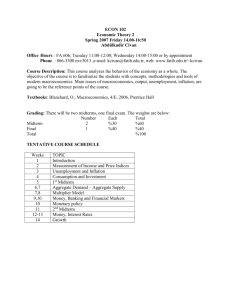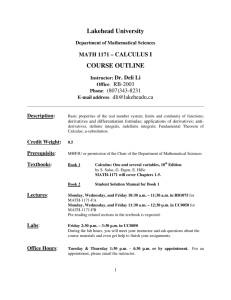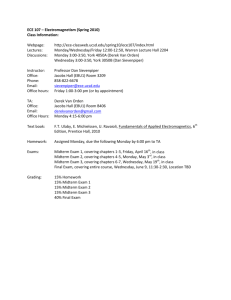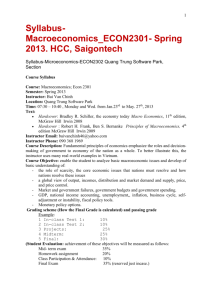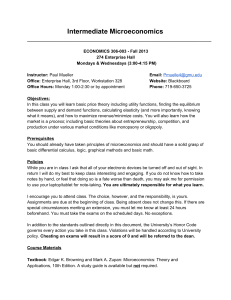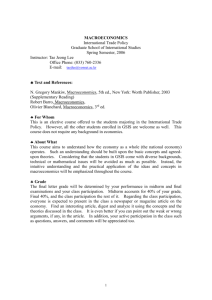Economics 110: Principles of Macroeconomics (6
advertisement
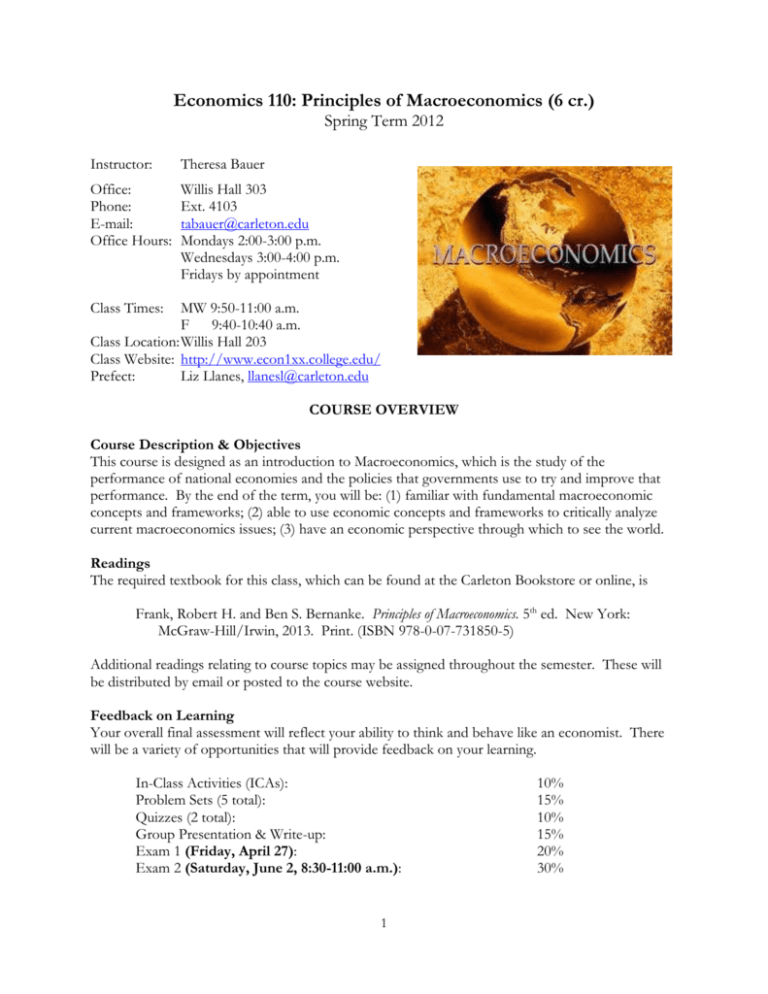
Economics 110: Principles of Macroeconomics (6 cr.) Spring Term 2012 Instructor: Theresa Bauer Office: Phone: E-mail: Office Hours: Willis Hall 303 Ext. 4103 tabauer@carleton.edu Mondays 2:00-3:00 p.m. Wednesdays 3:00-4:00 p.m. Fridays by appointment Class Times: MW 9:50-11:00 a.m. F 9:40-10:40 a.m. Class Location: Willis Hall 203 Class Website: http://www.econ1xx.college.edu/ Prefect: Liz Llanes, llanesl@carleton.edu COURSE OVERVIEW Course Description & Objectives This course is designed as an introduction to Macroeconomics, which is the study of the performance of national economies and the policies that governments use to try and improve that performance. By the end of the term, you will be: (1) familiar with fundamental macroeconomic concepts and frameworks; (2) able to use economic concepts and frameworks to critically analyze current macroeconomics issues; (3) have an economic perspective through which to see the world. Readings The required textbook for this class, which can be found at the Carleton Bookstore or online, is Frank, Robert H. and Ben S. Bernanke. Principles of Macroeconomics. 5th ed. New York: McGraw-Hill/Irwin, 2013. Print. (ISBN 978-0-07-731850-5) Additional readings relating to course topics may be assigned throughout the semester. These will be distributed by email or posted to the course website. Feedback on Learning Your overall final assessment will reflect your ability to think and behave like an economist. There will be a variety of opportunities that will provide feedback on your learning. In-Class Activities (ICAs): Problem Sets (5 total): Quizzes (2 total): Group Presentation & Write-up: Exam 1 (Friday, April 27): Exam 2 (Saturday, June 2, 8:30-11:00 a.m.): 1 10% 15% 10% 15% 20% 30% COURSE TIMELINE Class Schedule The course will be divided into five modules, with each module focusing on a particular theme or aspect of Macroeconomics. Modules lengths will vary slightly. Module 1: Introduction – A way of thinking about the world. This module will introduce you to 7 Core Principles that economists use for understanding almost any economic situation. Monday, March 26 Course Overview Introduction to Macroeconomics Wednesday, March 28 Chapter 1: Thinking Like an Economist Chapter 1 Appendix: Working with Equations, Graphs, and Tables Chapter 2: Comparative Advantage Friday, March 30 Chapter 3: Supply and Demand Chapter 3 Appendix: The Algebra of Supply and Demand Monday, April 2 Chapter 3 - Continued Module 2: Macroeconomics: Data and Issues – The big picture! Macroeconomics is the study of the performance of national economies and the policies that governments use to try and improve that performance. This module will introduce you to the central concepts and measurements used in macroeconomics. Wednesday, April 4 Chapter 4: Spending, Income, and GDP Friday, April 6 Discussion Monday, April 9 Chapter 5: Inflation and the Price Level Wednesday, April 11 Chapter 6: Wages and Unemployment Friday, April 13 In-Class Quiz (Chapters 1 – 6) Discussion 2 Module 3: The Economy in the Long Run – Why are our lives different than our ancestors? This module will focus on the behavior of the economy in the long run, including the factors that cause the economy to grow and develop. Monday, April 16 Chapter 7: Economic Growth Wednesday, April 18 Chapter 8: Saving, Capital Formation, and Financial Markets Friday, April 20 Discussion Monday, April 23 Chapter 9: Money, Prices, and the Financial System Wednesday, April 25 Review for Midterm; Catch-up (if necessary) Friday, April 27 MIDTERM EXAM (Chapters 1 – 9) No class April 30: Midterm Break Module 4: The Economy in the Short Run – Are we on a rollercoaster ride? In this module we will explore the causes of short-term fluctuations in key economic variables and options available to government policy-makers for stabilizing the economy. Wednesday, May 2 Midterm Feedback Chapter 10: Short-Term Economic Fluctuations Friday, May 4 Chapter 10 - Continued Monday, May 7 Chapter 11: Spending, Output, and Fiscal Policy Wednesday, May 9 Chapter 12: Monetary Policy and the Federal Reserve Friday, May 11 Discussion; Presentation Groups Monday, May 14 Chapter 13: Aggregate Demand, Aggregate Supply , and Business Cycles Wednesday, May 16 In-Class Quiz (Chapters 10 – 12) Friday, May 18 Presentation Groups: Work Day Monday, May 21 Chapter 14: Macroeconomic Policy 3 Module 5: The International Economy – Get out your passports! In this final module we will look at exchange rates and the relationship among international trade in goods, international capital flows, and domestic capital formation. Wednesday, May 23 Chapter 15: Exchange Rates, International Trade, and Capital Flows Friday, May 25: Discussion Presentation Groups: Work Day Monday, May 28 Final Group Presentations Wednesday, May 30 Course Wrap-Up and Evaluations FINAL EXAM: Saturday, June 2nd, 8:30am - 11:00am. Room: TBA 4 Class Calendar Chapters are expected to be read before class of the date given. Similarly, assignments are due at the beginning of class of the date given. The Class Calendar is tentative and subject to change during the term. If there are any changes to the Class Calendar, an announcement will be made in class and a new Class Calendar will be emailed and/or posted to the class website. Class Date Chapter(s) Topics 1 Mar. 26 2 Mar. 28 1, 1A, 2 3 Mar. 30 3, 3A 4 Apr. 2 5 Apr. 4 6 Apr. 6 7 Apr. 9 5 The Consumer Price Index (CPI) and Inflation 8 Apr. 11 6 Employment and The Labor Market 9 Apr. 13 10 Apr. 16 7 Economic Growth and Productivity 11 Apr. 18 8 National Savings and Investments 12 Apr. 20 13 Apr. 23 14 Apr. 25 15 Apr. 27 MIDTERM EXAM Apr. 30 NO CLASS: MIDTERM BREAK Assignment Due Course Overview and Introduction 7 Core Principles of Economics Signed Course Contract Supply & Demand – An Overview/Review; Demand, Supply and Market Equilibrium Supply & Demand – Predicting and Explaining Changes in Prices and Quantities 4 Gross Domestic Product (GDP) Homework 1 Discussion Quiz & Discussion Homework 2 Discussion 9 Money and the Financial System Review for Midterm & Catch-up 10 Midterm Exam Feedback, Midterm Feedback; Recessions and Expansions 16 May 2 17 May 4 18 May 7 11 Spending and Fiscal Policy 19 May 9 12 Federal Research and Monetary Policy Output Gaps and Cyclical Unemployment 5 Homework 3 20 May 11 Discussion; Presentation groups 21 May 14 22 May 16 Quiz 23 May 18 Presentation work day 24 May 21 14 Macroeconomic Policy 25 May 23 15 Exchange Rates and the International Economy 26 May 25 Discussion; Presentation work day Homework 5 27 May 28 Group Presentations Group Write-up 28 May 30 Course Recap and Wrap-up 13 Aggregate Demand and Aggregate Supply Homework 4 FINAL EXAM: Saturday, June 2nd, 8:30am - 11:00am. Room: TBA 6 COURSE POLICIES In-Class Activities (ICAs) In-Class Activities will be integrated into each class meeting. The material will come from readings assigned for the day as well as material covered during the class. Sometimes you will be asked to conduct an activity independently, but often you will work with a partner or a small group. These are turned in during the class and count toward your final grade. Problem Sets You will be responsible for completing five problem sets that consist of numerical calculations, drawing graphs and diagrams, short answers, and analyses of current issues. These will be used to assess your ability to understand, examine, analyze and critique course material and relevant current topics. You may work together with 2-3 other students, in fact, this is encouraged‼ However, you must write up your own answers independently and list all peers that you collaborated with. Group Presentation & Write-Up You will be assigned to a group of 4-5 students. Parameters of the assignment will be provided later. Your grades for the group projects are a function of: Your group’s write-up (graded by the Instructor) Your group’s in-class presentation (evaluated by your classmates and the Instructor) Your contribution to the group (evaluated by your fellow group members) Student Role You are expected to come to each class on time and be fully prepared to discuss the current day’s readings. You are expected to have an open mind toward the topics discussed, and to treat your peers and your instructor with professionalism and respect. Additionally, you are expected to complete all assignments by their assigned due date. Instructor Role As your instructor, you can expect that I will: treat you with respect and encouragement, create an atmosphere conducive to learning, provide a safe environment for you to ask questions so that you may fully grasp the material of the course, and provide constructive feedback on your performance. Use of Personal Electronic Devices in the Classroom This is a CELL PHONE FREE ZONE. Please turn your cell phone off (not vibrate) before entering the classroom. Since Economics relies on drawing graphs, making numerical calculations, etc. using laptops and tablets are not as convenient. If you must use an electronic device for taking notes, please see me before the beginning of the second class meeting1. Additionally, you will be expected to email me your notes at the end of each class period. Attendance Policy This course will rely on team work, in-class discussions, and active learning activities. As a result, missing classes not only negatively affects your ability to learn the material, but it negatively affects the learning process for your peers. If you will need to miss a class, I ask that you please inform me in writing (delivered to me in person or via email) prior to the day of the class that you will miss. You will also be required to sign a contract that you will not use the Internet (e.g. web surfing, emails, Facebook, Twitter, instant messaging, and other social networking sites) during class. 1 7 Late Work Policy It is important for your learning and your ability to participate in the classroom community that you are prepared and stay on top of the assignments of the course. Late work is detrimental to this learning process and can quickly become unmanageable with newer assignments. You will receive only partial credit for homework submitted after the beginning of the class period on the day an assignment is due. Minimal or zero credit will be given for assignments turned in after the answer key has been posted. Homework One of the biggest goals I have for you is to be able to think critically about the Resubmission course material. Therefore, if points are subtracted from an answer you believe is Policy correct, you are allowed to challenge the grading of one question per assignment. This must be submitted in writing as a clear, structured, and well-articulated argument before the next class period. The original assignment must accompany this resubmission, as well as references to supporting documents and/or materials. Missed Exams and Retakes You will not be allowed to retake exams or make up missed exams. Missing the final exam will result in an “Incomplete” grade. The midterm and final exam times and locations are listed in this syllabus; please plan your schedule accordingly. Incomplete Coursework Policy If a student does not complete the required coursework within the timeframe set forth in this syllabus the student will receive a letter grade F. Only under extraordinary circumstances will an Incomplete (I) be given, which will only be granted after the student, instructor, and Department Chair have agreed upon a written timetable for the completion of all outstanding coursework. Academic Dishonesty An act of academic dishonesty is a serious offense in a college community. By seeking credit for work which is not his or her own, a student takes unfair advantage of fellow students, who accept their limitations, and of teachers, who trust that the work received is the student's. Dishonesty in academic work, particularly in the form of plagiarism, also defeats the process of self-discovery which is the heart of a liberal education. People establish their integrity and personality only as they learn to distinguish what is significantly their own from what belongs to another, only as they learn to value their own work, including its limitations, in relation to the work of others. As a scholar, finally, one should be generous in acknowledging the work of other scholars, for their work makes possible one's own. At Carleton College, an act of academic dishonesty is therefore regarded as conflicting with the work and purpose of the entire College and not merely as a private matter between the student and an instructor; all cases involving such dishonesty are referred to the Academic Standing committee for appropriate action. This action can vary from a grade of Unsatisfactory in the given piece of work to a recommendation of permanent dismissal from the College in cases of repeated or serious offenses. You can find information about academic dishonesty at: http://apps.carleton.edu/campus/doc/honesty/ 8 After reading the entire syllabus, please detach this page, sign it, and turn it in at the beginning of the class on Wednesday, March 28. I have read the syllabus for Economics 110-01 and I understand my obligations for the course. Signature: _________________________________________ Date: _________________ 9
